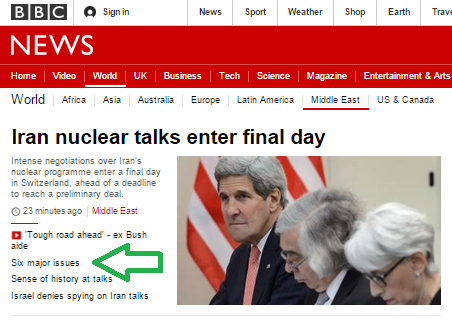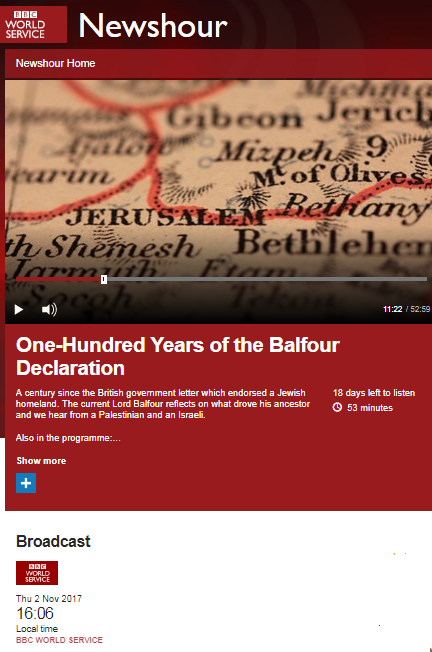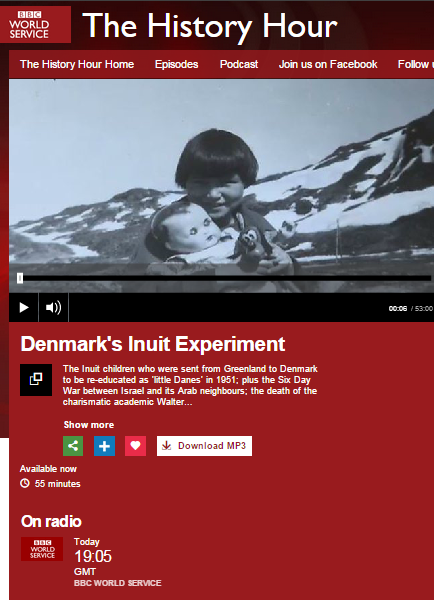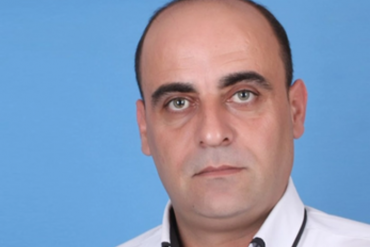As the P5+1 negotiations with Iran in Lausanne approached their deadline, coverage on the BBC News website’s Middle East page included what appeared to be a handy guide intended to assist audiences in better understanding the technical background to the story.
That impression continued in the opening paragraph of the March 30th article titled “Iran nuclear crisis: Six key points“.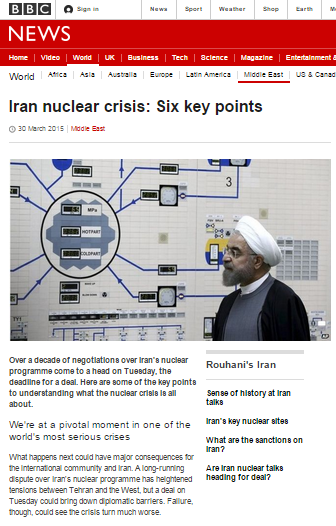
“Over a decade of negotiations over Iran’s nuclear programme come to a head on Tuesday, the deadline for a deal. Here are some of the key points to understanding what the nuclear crisis is all about.”
However, what audiences actually got was a dumbed-down space-filler which did little to enhance their understanding of the real issues lying behind the difficulties in securing the framework to an agreement which would prevent Iran from gaining nuclear weapons.
The “six key points” promoted in the BBC’s article are as follows:
- We’re at a pivotal moment in one of the world’s most serious crises.
- It’s about fear and distrust
- Lots of countries have nuclear weapons, but Iran’s case is different
- Iran has been severely hit by sanctions
- Some countries are unhappy about a pending deal
- This is not the end of it
Under the second heading, readers are told:
“A core group of powers – the US, UK, France, Russia, China and Germany – want to be satisfied that Iran won’t have the capacity to make a bomb in under a year if it decided to – the so-called “break-out” time.”
No further details are given on the technical aspects of the definition of break-out time or how the pending agreement would guarantee that one year minimum time-frame.
The article continues the long-standing BBC practice of ‘impartiality box ticking’ presentation of Iranian claims, despite the fact that the IAEA has clearly stated that it is not in a position “to conclude that all nuclear material in Iran is in peaceful activities”.
“Iran for its part says it does not want a nuclear bomb, but insists on exercising its right to run a peaceful nuclear industry. It also wants crippling international sanctions lifted quickly.
Many countries do not believe Iran’s declared intentions, and there is fear of what Iran might do with a nuclear weapon, and of the prospect of a nuclear arms race in one of the world’s most unstable regions.”
Under the third heading readers are told:
“It looks to some like Iran is being singled out – after all, many countries have nuclear programmes and at least eight possess nuclear weapons.” […]
“Iran says the international community is displaying double standards by not doing anything about its arch-foe Israel, which is widely believed to have a nuclear arsenal – though Israel has neither confirmed nor denied this. Israel however, like nuclear-armed India and Pakistan, is not a signatory to the NPT.”
On the topic of PMDs (possible military dimensions), the article merely states:
“What also worries the international community are unanswered questions surrounding possible military dimensions to Iran’s nuclear programme.
A 2007 US intelligence report said Iran had a nuclear weapons programme but “halted” this in 2003. The global nuclear watchdog, the International Atomic Energy Agency (IAEA), has been investigating this in parallel to the main nuclear talks, but says Iran has not provided enough information about its past activities. These include possible nuclear-related tests at a secret military site, where Iran has barred IAEA inspectors.”
The BBC article does not visit the topic of if or how that issue will be addressed in the emerging framework deal. No mention is made of the contentious issue of Iran’s existing stockpile of uranium, of the all-important topic of verification of Iranian compliance with the terms of any deal or of the wider – but related – picture of Iranian activities across the Middle East. Hence, when readers get to the section titled “Some countries are unhappy about a pending deal” they are still not in a position to understand the background to the vague statements it includes.
The BBC has some talented science correspondents who are surely capable of compiling the long-needed fact-based backgrounder which has been glaringly absent from the corporation’s coverage of the P5+1 negotiations with Iran to date. In the meantime, readers will no doubt find this fact sheet on the subject of nuclear break-out time written by the former deputy director-general for safeguards at the IAEA helpful to their understanding of this story.
Related Articles:
New BBC backgrounder on Iranian nuclear programme
BBC WS fails to disclose Iranian regime connections of ‘expert panel’ member
What have BBC audiences been told about the P5+1 deal with Iran?
Does BBC coverage of the P5+1 deal with Iran adequately promote audience understanding of the issue?
BBC continues to mislead audiences on Iran nuclear issue
BBC’s Bowen dumbs down and distorts the Iranian nuclear issue
Superficial BBC reporting on emerging P5+1 deal with Iran

